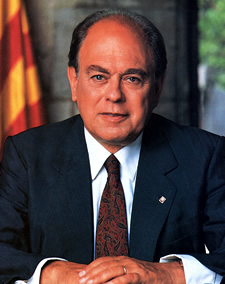Jordi Pujol facts for kids
Quick facts for kids
Jordi Pujol
|
|
|---|---|

Official portrait, 1980
|
|
| 126th President of the Government of Catalonia | |
| In office 29 April 1980 – 18 December 2003 |
|
| First Counselor | Artur Mas (2001–2003) |
| Preceded by | Josep Tarradellas |
| Succeeded by | Pasqual Maragall |
| Minister without Portfolio | |
| In office 5 December 1977 – 24 April 1980 |
|
| President | Josep Tarradellas |
| Member of the Parliament of Catalonia | |
| In office 10 April 1980 – 23 September 2003 |
|
| Constituency | Barcelona |
| Member of the Congress of Deputies | |
| In office 1 July 1977 – 12 March 1980 |
|
| Constituency | Barcelona |
| Personal details | |
| Born | 9 June 1930 Barcelona, Catalonia, Spain |
| Political party | CDC (1974–2016) |
| Spouse |
Marta Ferrusola
(m. 1956; died 2024) |
| Children | 7 |
| Signature | |
Jordi Pujol i Soley (born 9 June 1930) is a politician from Catalonia, Spain. He was the leader of the political party Convergència Democràtica de Catalunya (CDC) for many years. From 1980 to 2003, he served as the President of the Generalitat de Catalunya. The Generalitat is the government of Catalonia.
Contents
Early Life and Activism
Jordi Pujol was born in Barcelona, a major city in Catalonia, Spain. He went to the German School of Barcelona. Later, he studied medicine at the University of Barcelona and became a doctor.
During his time at college, Jordi Pujol joined groups that wanted to bring back the spirit of Catalonia. This was important because Spain was under a strict government called Franco's dictatorship. This government had limited many freedoms.
In 1960, Jordi Pujol helped organize a protest. People sang a forbidden song called Cant de la Senyera (The Song of the Flag). This happened during an event honoring a Catalan poet. Because of his actions against the government, Pujol was arrested and held for a time.
Invention of Neobacitrin Ointment
As a doctor, Jordi Pujol also worked in his family's laboratory. There, he invented an antibiotic cream called Neobacitrin. This ointment became very popular and is still used today.
Political Career and Presidency
In 1974, Jordi Pujol started a political party called Convergència Democràtica de Catalunya (CDC). This name means Democratic Convergence of Catalonia. At first, the party was not officially recognized. It became legal in 1977, after Franco's dictatorship ended. This period was known as the Spanish transition to democracy.
From 1977 to 1980, Pujol had a special role in the temporary government of Catalonia. He was a Minister without portfolio, meaning he had important duties without leading a specific department. He also helped create the Statute of Autonomy of Catalonia. This was a set of rules for Catalonia to govern itself.
In 1977, he was elected to the Spanish Congress of Deputies. This is like being a member of the national parliament in Spain. He was re-elected in 1979 but left this role in 1980.
On 20 March 1980, Catalonia held its first elections for its own parliament after the dictatorship. Pujol's party, Convergència i Unió, won. On 24 April 1980, Jordi Pujol became the President of the Generalitat de Catalunya. He was re-elected five more times, serving until 2003.
Pujol believed in countries working together in Europe. In 1985, he helped start a group called the Council of the Regions of Europe. This group later became the Assembly of European Regions (AER). He was the president of the AER from 1992 to 1996. In 1996, he received an honor from Quebec, Canada, for making ties stronger between Quebec and Catalonia.
Jordi Pujol retired from politics in 2003. He passed the leadership of his party, CDC, to Artur Mas. After his presidency, he gave over 16,000 documents from his time in office to the Biblioteca de Catalunya (Library of Catalonia).
Jordi Pujol and Catalan Identity
During his time as President, Jordi Pujol focused on strengthening Catalonia's identity. He wanted Spain to recognize Catalonia as a unique region with its own culture and personality. He believed Catalonia should have its own government and be respected.
Pujol always supported the idea of a federal Spain. This means different regions would have more power to govern themselves. However, he sometimes felt that the Spanish government did not fully respect Catalonia. He has said that more people now want Catalonia to be independent. He believes they have the right to want this.
Personal Life

Jordi Pujol married Marta Ferrusola in 1956. They had seven children together. Marta Ferrusola passed away on 8 July 2024, at the age of 89. She had been living with Alzheimer's disease for six years.
See also
 In Spanish: Jordi Pujol para niños
In Spanish: Jordi Pujol para niños
 | Selma Burke |
 | Pauline Powell Burns |
 | Frederick J. Brown |
 | Robert Blackburn |

